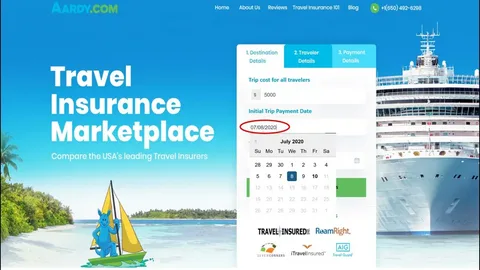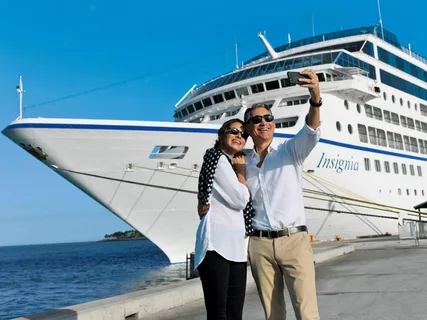Planning a cruise in 2025? Discover why cruise travel insurance is essential for protecting your health, money, and trip—from unexpected cancellations to emergencies at sea.
Introduction: Smooth Sailing Requires Smart Planning
Cruises are one of the most relaxing ways to travel—unpack once, explore multiple destinations, and enjoy all-inclusive luxury on the open sea. But even the most picture-perfect voyages can be disrupted by illness, injury, weather delays, or itinerary changes.
That’s where cruise travel insurance comes in.
Cruise-specific insurance offers a safety net tailored to sea voyages—covering medical care onboard, missed connections, emergency evacuations, and trip interruptions unique to cruising. In 2025, with cruise prices and risks rising, skipping insurance could be a costly mistake.
What Is Cruise Travel Insurance?
Cruise travel insurance is a specialized insurance product designed to protect you before, during, and after your sea voyage. Unlike standard travel insurance, cruise policies are structured to address issues unique to being at sea and visiting multiple ports.
Typical coverage includes:
- Trip cancellation and interruption
- Onboard medical treatment and hospital care
- Emergency evacuation off the ship
- Missed port departure or connection
- Trip delay and baggage loss
- Cabin confinement compensation
- Weather-related cancellations
Whether you’re embarking on a Caribbean cruise or a luxury Mediterranean journey, the right policy ensures you don’t lose your investment—or your peace of mind.
Why Cruise Insurance Is a Must in 2025
1. Limited Medical Facilities at Sea
Cruise ships have small medical centers that can treat minor ailments, but if a serious emergency occurs, you may need emergency evacuation by helicopter or speedboat—costing tens of thousands of dollars out-of-pocket without insurance.
Alt tag: “Helicopter evacuating cruise passenger with medical emergency”
2. Non-Refundable Fares
Most cruise lines have strict cancellation policies. If you cancel even a few weeks before sailing, you may lose 50% to 100% of your fare unless you have trip cancellation protection.
3. Missed Ship Departures
If a connecting flight is delayed and you miss your port of departure, the cruise won’t wait. Insurance that covers missed connections can help rebook and reimburse expenses to catch up with your ship.
4. Port Itinerary Changes
Storms or political instability can cause ports of call to be skipped. Insurance may reimburse for lost excursions or compensate for shortened itineraries.
5. COVID and Health Disruptions
While many restrictions have relaxed, outbreaks or health alerts can still cancel trips or require quarantines onboard. Travel insurance with quarantine or isolation benefits can cover additional costs.
wants latest news on sports check sportsoclock.com
What Cruise Insurance Typically Covers
Let’s explore the main components of cruise insurance and how each protects your voyage.
Emergency Medical Coverage
Pays for treatment onboard or in port hospitals. Look for at least $100,000 in coverage.
Emergency Medical Evacuation
Evacuation from ship to nearest hospital or back home. Recommended limit: $250,000 or more.
Trip Cancellation
Reimburses you for non-refundable cruise fare, hotel bookings, or flights if you cancel for a covered reason (like illness, family emergency, or weather).

Trip Interruption
Covers costs if you need to cut your trip short and fly home or rejoin the cruise.
Baggage Delay & Loss
Replaces clothes and essentials if your bags are delayed or lost en route to the port.
Missed Connection
Pays for transportation, hotel stays, and meals if you miss your departure and must catch up with the ship.
Cabin Confinement
Daily payout if you’re confined to your cabin due to illness or onboard outbreaks.
Alt tag: “Cruise traveler reviewing cabin confinement insurance benefits”
Common Scenarios Where Cruise Insurance Saves You
Scenario 1: Medical Emergency at Sea
You’re on a 7-day Caribbean cruise and suffer chest pain. The onboard doctor recommends urgent evacuation. Without cruise insurance, the cost for helicopter transport and hospital admission could exceed $50,000. A comprehensive plan would cover this fully.
Scenario 2: Missed Flight and Ship
Your flight to Miami is delayed due to a snowstorm. You miss your cruise’s departure. With insurance, your missed connection benefit pays for hotel, meals, and alternate transport to join the cruise at the next port.
Scenario 3: Port Cancellation
Your ship skips two ports due to a hurricane. Your excursion refunds and trip interruption coverage protect your prepaid bookings.
Key Features to Look for in Cruise Travel Insurance
When choosing a cruise-specific travel insurance plan, focus on:
1. Cruise-Specific Medical Coverage
Onboard treatment can be expensive and may not be reimbursed by your home health insurance or Medicare. Choose a plan with high medical and evacuation limits.
2. Pre-Existing Conditions Waiver
If you have health issues, make sure the policy covers pre-existing conditions—usually available if you purchase within 14-21 days of booking.
3. Cancel for Any Reason (CFAR)
Want more flexibility? CFAR lets you cancel even if your reason isn’t “covered” (e.g. personal choice), typically for 75% reimbursement.
4. Coverage for Missed Ports
Reimbursement for port fees and excursions if the cruise line changes course due to weather or other issues.
5. Cabin Confinement Payouts
If you’re quarantined or ill, you may miss excursions and shipboard activities. Some policies pay $50–$200 per day during confinement.
Alt tag: “Cruise insurance brochure showing CFAR and trip interruption benefits”
Best Types of Cruise Travelers Who Need Insurance
Not sure if you need cruise insurance? If you fall into any of these categories, it’s highly recommended:
- First-Time Cruisers – More prone to schedule disruptions and planning errors
- Seniors Over 65 – Increased medical risk and Medicare doesn’t cover foreign healthcare
- Traveling with Kids or Grandkids – More chance of sickness or needing to cancel
- Taking Expensive or Luxury Cruises – Bigger investment = bigger potential loss
- Cruise During Hurricane Season – Itinerary changes are common due to storms
- Connecting Flights or Multi-Leg Journeys – Higher risk of delays or missed departures
How Much Does Cruise Travel Insurance Cost?
Cruise travel insurance is surprisingly affordable—typically 4% to 10% of your total trip cost, depending on age, duration, coverage limits, and optional add-ons like CFAR.
| Total Cruise Cost | Approximate Insurance Cost | Notes |
|---|---|---|
| $1,500 | $60 – $150 | Basic medical & trip cancellation |
| $5,000 | $200 – $500 | Full coverage with CFAR, evacuation |
| $10,000 | $400 – $800 | High-end cruise, luxury or international |
Premiums tend to increase with age, higher trip value, or additional coverage like pre-existing condition waivers or CFAR.
Tips for Choosing the Best Cruise Insurance in 2025
1. Buy Insurance Early
Purchase within 14–21 days of your first payment to qualify for CFAR and pre-existing condition coverage.
2. Compare Coverage, Not Just Cost
A cheap plan may lack key protections. Look for detailed coverage limits and exclusions.
3. Read the Fine Print
Understand what’s not covered—like pandemics, high-risk excursions, or untreated pre-existing conditions.
4. Declare Pre-Existing Conditions
Always be honest when applying. Failing to disclose medical history can void your policy.
5. Check for COVID Coverage
Make sure the policy includes trip cancellation, interruption, and confinement due to COVID-19.

Frequently Asked Questions (FAQs)
Q: Can I use my regular health insurance during a cruise?
Usually not. Most U.S. health plans (including Medicare) do not cover international waters or foreign ports.
Q: Is cruise insurance required by cruise lines?
Not always, but some cruise lines or countries require proof of insurance, especially post-pandemic.
Q: What if I get sick before the cruise?
If your policy includes trip cancellation for illness, you can be reimbursed for your prepaid costs.
Q: Does travel insurance cover excursions?
Yes—if you prepaid for excursions and they are canceled or missed due to ship delays or illness, insurance can reimburse you.
Q: What happens if the cruise line changes the itinerary?
Plans with missed port coverage can reimburse part of your fare or specific activities missed.
Final Thoughts: Don’t Set Sail Without a Safety Net
Cruises offer unforgettable experiences—but also unique travel risks. A single missed port, lost bag, or illness onboard can turn a dream vacation into a nightmare if you’re not protected.
That’s why cruise travel insurance isn’t a luxury—it’s a necessity.
To recap, here’s what your ideal cruise insurance should include:
- Emergency medical & evacuation (minimum $100K/$250K)
- Trip cancellation & interruption coverage
- Pre-existing condition waiver (if applicable)
- Baggage, delay, and missed connection benefits
- Optional CFAR and cabin confinement payouts
Take a few minutes to choose the right plan for your trip—and set sail knowing you’re covered from bow to stern.